The football industrial complex has had a handle on how sleep impacts performance for years now, but basketball is just now beginning to wrap its arms around the issue, which makes sense. Only basketball, after all, asks its players to play in Portland on Tuesday, Denver on Wednesday and Detroit on Friday.
As basketball players catch up to the sleep revolution, the results have been staggering -- and instructive for coaches looking to make the same point for their own athletes, specifically as summer arrives and the routine of the school year disappears.
For example, here's how Golden State Warriors forward Andre Iguodala's performance changed after a good night's sleep, as tracked by a sleep tracker on his wrist and provided to CBS.

Another sleep tracker popular among NBA players measures a previous night's sleep by colors -- green being good, yellow indicating a mediocre night's sleep and red a poor one. Here's how one player's performance broke down after a 24-game study
On a good night's sleep, the player produced an assist-to-turnover ratio that nearly doubled Mike Conley as the best among NBA point guards. Without it, though, the same player was now twice as bad as D'Angelo Russell, the lowest-ranking player among all qualifying NBA point guards. Beyond that, players taking part in a 129-day study saw their injuries drop by 60 percent and sicknesses drop by 54 percent.
Next, a Stanford study of 11 basketball players found that when its subjects documented 10 hours of sleep:
- Free throw percentage rose 9 percent
- Three-point shooting rose 9.2 percent
Finally, a three-year study of 80 Major League Baseball players conducted by the Martha Jefferson Hospital Sleep Medicine Center:
- Of players who reported low levels of sleepiness: 72 percent were still in MLB
- Players who were twice as sleepy as the first group: 39 percent were still in MLB
- Players who were three times as sleepy as the first group: 14 percent were still in MLB
If numbers aren't enough, take it from the testimony of an expert: in addition to fighting off injuries, nothing improves decision-making (as seen in the turnover numbers listed in the two separate studies above) like long, deep sleep.
"If you don't sleep for a long enough period, you might get the majority of deep sleep, but there's no way to get REM sleep," sleep specialist Jason Donahue said. "This is where we learn our playbooks, remember who to pass to when you have two seconds left, remember the play that was just drawn up and stay cool under pressure."
(HT CBS Sports)
